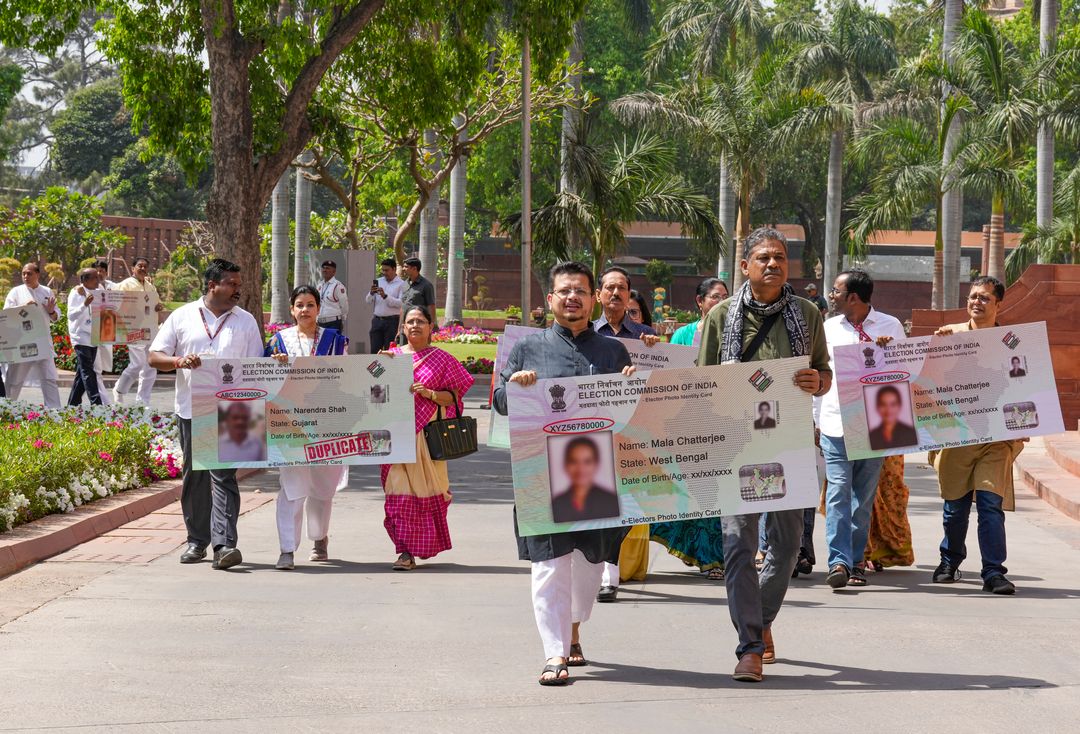Saket Gokhale cites Election Commission’s own guidelines, claims EPIC duplication impossible
Trinamool Congress (TMC) escalated its confrontation with the Election Commission of India (ECI) on Tuesday, dismissing the Commission's clarification on duplicate voter ID numbers as a "cover-up". The party accused the ECI of violating its own guidelines by allotting identical EPIC (Electronic Electoral Photo Identity Card) numbers to voters in different states.Rajya Sabha MP and senior TMC leader Saket Gokhale highlighted the issue by sharing excerpts from the Election Commission's Handbook for Electoral Registration Officers on social media platform X. Gokhale’s response came after the TMC had given the Election Commission a 24-hour ultimatum on Monday to acknowledge and rectify what the party called an "epic scam."
Election Commission's Explanation "Contradictory": TMC
Gokhale accused the Election Commission of attempting to "brazen out" the situation, even after admitting irregularities. The controversy first came to the spotlight following concerns raised by West Bengal Chief Minister and TMC supremo Mamata Banerjee.In response to Banerjee's allegations, the EC had clarified on Sunday that duplicate EPIC numbers were issued due to certain states using the same "alphanumeric series." However, Gokhale countered this, emphasizing that the Commission's own guidelines explicitly prohibit such duplication.
"EPIC card numbers are an alphanumeric sequence comprising three letters and seven digits," Gokhale explained. He added, "The Election Commission’s handbook clearly specifies that these three letters, known as Functional Unique Serial Numbers (FUSN), must differ for every Assembly constituency, making duplication impossible even across constituencies within the same state."
Gokhale questioned how voters in West Bengal, Haryana, Gujarat, and other states could have been assigned the same EPIC numbers, branding the EC’s explanation as inherently flawed.
Duplicate EPIC Numbers Could Lead to Voter Suppression, Alleges TMC
The TMC further claimed that duplicate voter IDs could result in voters being unfairly denied the right to vote due to mismatched photographs on electoral rolls."In photo electoral rolls, voters are identified by their EPIC numbers and corresponding photos. If the same EPIC number is issued to voters in different states, the resulting photo mismatch can prevent legitimate voters from exercising their voting rights," Gokhale argued. He alleged that this could systematically disenfranchise voters likely to support non-BJP parties.
Gokhale demanded transparency from the Election Commission, calling for an impartial investigation into the matter. He also asked the EC to reveal the total number of active EPIC cards and disclose how many duplicate numbers are currently in circulation.
Election Commission's Credibility Under Scrutiny
TMC Lok Sabha MP Kirti Azad sharply criticized the Election Commission, drawing parallels with the Supreme Court’s earlier description of the CBI as a "caged parrot." Azad labeled the EC a "caged bird," accusing it of colluding with the ruling Bharatiya Janata Party (BJP)."The BJP can resort to anything to secure electoral victories, and such irregularities cannot occur without involvement from EC officials," Azad stated, intensifying allegations against the electoral body.
Parliamentary Session Likely to Address the Issue
According to sources, this controversy over duplicate voter IDs is expected to be raised prominently in the upcoming session of Parliament. TMC is coordinating with other INDIA bloc parties that have raised similar concerns about discrepancies in voters' lists in their respective states.The Election Commission previously justified the issue as stemming from a "decentralised and manual mechanism," which was in use before the transition to the centralized ERONET (Electoral Roll Management) system.
The political dispute underscores growing tensions between opposition parties and the Election Commission, raising critical questions regarding electoral fairness and the Commission’s impartiality ahead of future elections.

